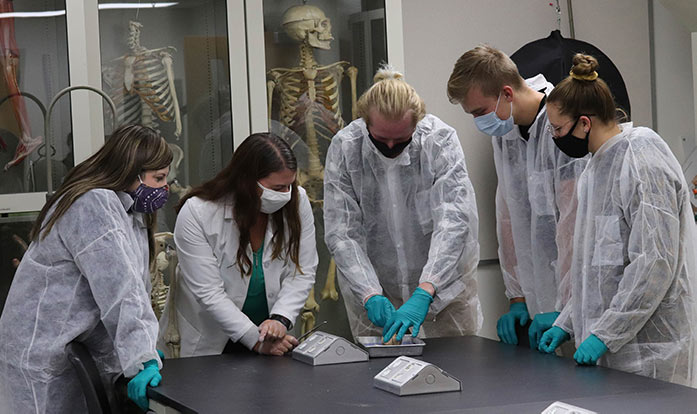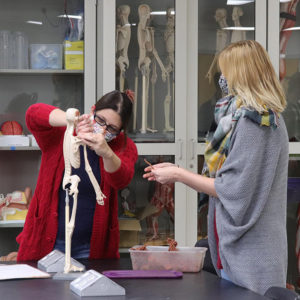 As a biology student at UWM, you will receive a strong foundation in all areas of
As a biology student at UWM, you will receive a strong foundation in all areas of
biology and the natural sciences that will prepare you for competitive admission to Medical, PA, Dentistry or Veterinary School. In fact, Biological Sciences is the major chosen most frequently by pre-professional students at UWM.In addition to our strong classroom and laboratory-based curriculum, many of our majors take advantage of the opportunity to engage in original laboratory research with Biological Sciences faculty members for course credit or by competing for fellowships through the Office of Undergraduate Research.
The Biological Sciences Department offers degrees in Biological Sciences and Microbiology. If you have specific interests in microorganisms and viruses you may be interested in the Microbiology Major. If you find the structure and function of organisms and biological processes at the level of cells and macromolecules you may want to choose to specialize with the Cellular and Molecular Biology (CMB) Option. Many pre-veterinary majors choose to focus on coursework in the Ecology, Evolution and Behavior (EEB) option. We also offer a Flexible Option for students wishing to explore broader interests alongside their pre-professional requirements.
Once you have declared a major within the Biological Sciences Department, you will be assigned to a faculty member that will help you to design a course of study within the major and choose elective courses based on your specific interests and long-term goals. You should meet with both your pre-professional advisor and your Biological Sciences advisor each semester. You should count both advisors as part of your UWM advisory team. We are here to ensure that you are making timely progress in the major with courses that satisfy your curiosity and fulfill the admissions requirements for your post-graduate programs of choice.
After completing your foundational courses in the first two years of your study, you  will get to choose from a fascinating array of advanced elective courses in Cell Biology, Developmental Biology, Endocrinology, Genetics, Genomics, Immunology, Microbiology, Microscopy, Molecular Biology, Neurobiology, Physiology, and Virology.
will get to choose from a fascinating array of advanced elective courses in Cell Biology, Developmental Biology, Endocrinology, Genetics, Genomics, Immunology, Microbiology, Microscopy, Molecular Biology, Neurobiology, Physiology, and Virology.
Upper-level elective offerings that are of particular interest to pre-professional students include:
- Bio Sci 335 – Mammalian Reproductive Physiology, 3 credits
- Bio Sci 356 – Developmental Biology, 3 credits
- Bio Sci 370 – Mammalian Physiology, 3 credits
- Bio Sci 383 – General Microbiology, 4 credits Bio Sci 401 – Immunology, 3 credits
- Bio Sci 401 – Immunology, 3 credits
- Bio Sci 405 – General Virology, 3 credits
- Bio Sci 455 – Cellular, Molecular and Developmental Neurobiology, 3 credits
- Bio Sci 480 – Ecological Genetics, 3 credits
- Bio Sci 490 – Molecular Genetics, 3 credits
- Bio Sci 498 – Genetics of Development and Cancer, 3 credits
- Bio Sci 529 – Molecular Biology of Microorganisms, 3 credits
- Bio Sci 532 – Behavioral Ecology, 3 credits (preveterinary students)
- Bio Sci 535 – Bacterial Pathogenesis, 3 credits
- Bio Sci 539 – Laboratory Techniques in Molecular Biology, 4 credits
- Bio Sci 542 – Biological Electron Microscopy, 3 credits
- Bio Sci 543 – Scanning Electron Microscopy Laboratory, 2 credits
- Bio Sci 544 – Transmission Electron Microscopy Laboratory, 3 credits
- Bio Sci 564 – Endocrinology, 3 credits
- Bio Sci 565 – Gene Regulation in Stem Cells and Regeneration, 3 credits
- Bio Sci 566 – Cell Biology of Human Disease, 3 credits
- Bio Sci 572 – Functional Genomics, 3 credits
- Bio Sci 575 – Evolutionary Biology, 3 credits
- Bio Sci 580 – Experimental Microbiology, 4 credits